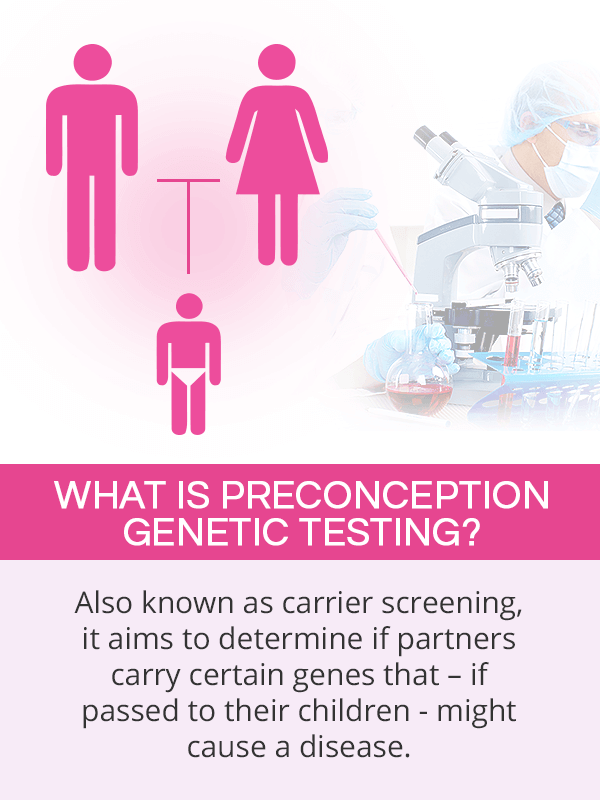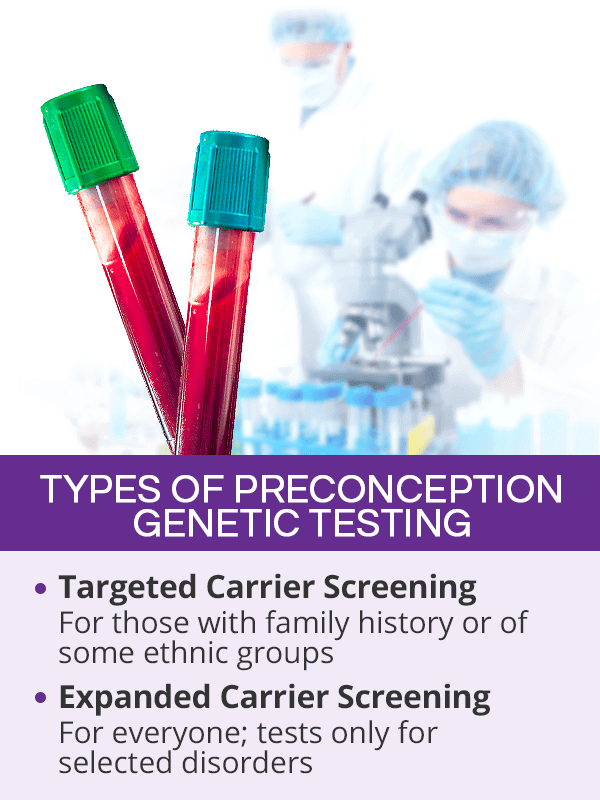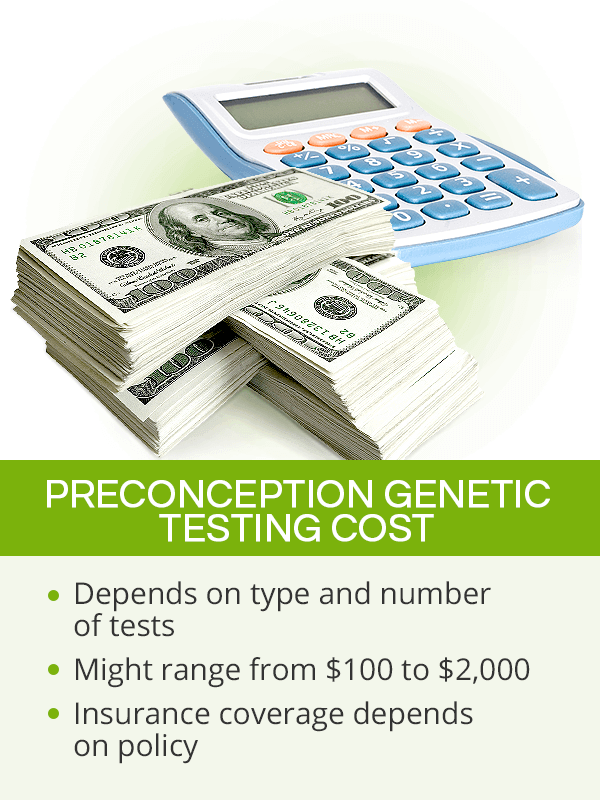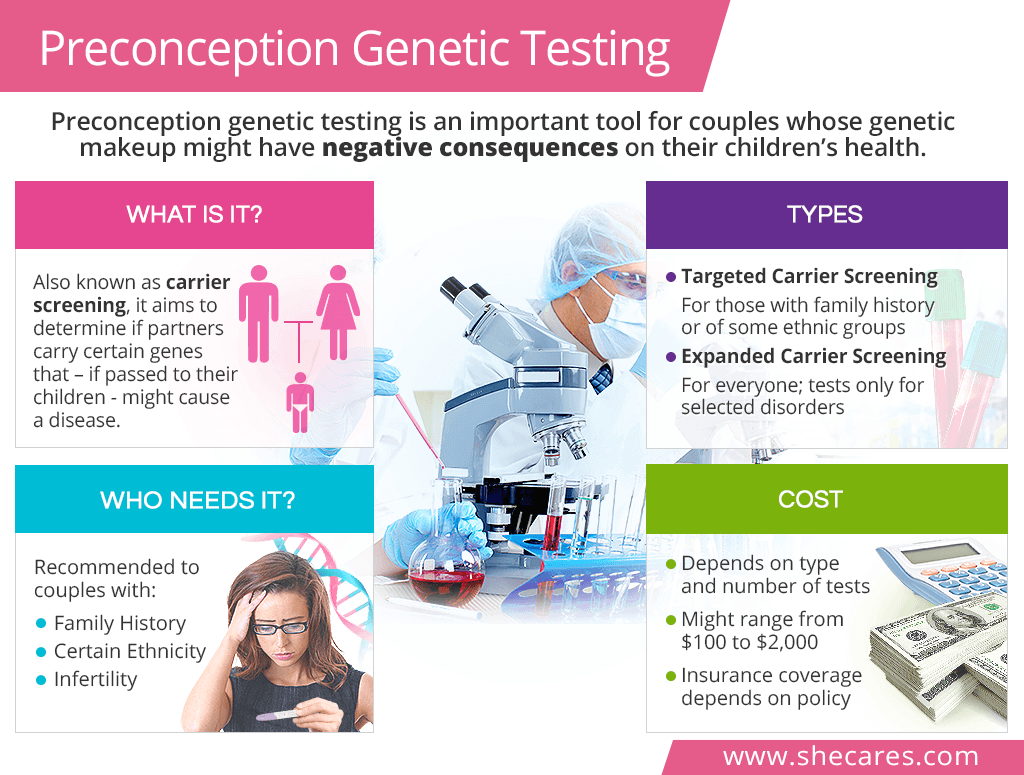What is Preconception Genetic Testing?

Genetic testing, also called carrier screening, is aimed at determining if partners have DNA abnormalities that can be potentially passed down to their offspring and cause a disease. Being a carrier of an inheritable disease means that the person's genetic code has an abnormal gene that can cause a disorder in a child, but not in the carrier.
Genetic carrier screening consists of analyzing a blood or saliva sample. Generally, the partner who is more likely to be carrying a genetic trait is screened first. The other partner is usually only tested when the first one proves to be a carrier.
Because there are more than 6,000 conditions that might be passed down from the parents, preconception genetic tests screen for the most common ones, such as cystic fibrosis, sickle cell disease, hemoglobinopathies, fragile X syndrome, Tay-Sachs disease, and spinal muscular atrophy.
Types of Preconception Genetic Testing

Although carrier screening can be done before or during pregnancy, partners with fertility problems and those with a known family history of inheritable conditions are advised to do the genetic testing before conceiving to understand the risks of gene transfer or to identify a genetic cause of their inability to conceive.
Because there are over 1,000 genetic tests available, most facilities performing pre-pregnancy genetic testing use the following two narrowing-down approaches. The individual choice depends on a woman's specific situation.
Targeted Carrier Screening. This type of preconception genetic testing is performed on partners who have family history of chromosomal abnormalities or belong to an ethnic group associated with increased risks of certain genetic disorders.
Expanded Carrier Screening. This carrier genetic testing consists of a selected list of disorders being tested for. It is done regardless of a woman's race or family history.
Who Needs Genetic Screening before Pregnancy

Preconception carrier testing might be recommended to couples with the following characteristics:
Family History
Collecting thorough family history will provide the doctor with essential information about potential risks and help you select the types of genetic testing before pregnancy that is most appropriate for a given couple. Having family members who have conditions like Down syndrome, Tay-Sachs disease, hearing loss, cystic fibrosis, or hemophilia necessitates further investigation about potential inheritance.
Certain Ethnicity
For unknown reasons, being of some ethnic groups makes people more likely to be carriers of certain genetic conditions. So, if any of the partners is of the following ethnic backgrounds, a carrier genetic testing might be beneficial. These tendencies do not mean that people outside of those ethnicities might not be affected as well.
African Americans have higher rates of sickle cell anemia.
Eastern Europeans of Jewish descent are more likely to have cystic fibrosis or Tay-Sachs disease.
People of African, Mediterranean, and South Asian descent have a higher prevalence of sickle cell disease.
Infertility
Couples who have not conceived after 12 consecutive months of having unprotected sex or those with a history of recurrent miscarriages or stillbirths are typically referred for infertility evaluations, including genetic testing. It is usually used as the last resort when other fertility tests do not provide clues about the underlying cause of conception problems. In men, genetic mutations can disrupt sperm production or transport, while female causes of infertility mostly concern ovulatory disorders.
Preconception Genetic Testing Cost

The cost of a preconception genetic testing greatly depends on the type and number of tests done. They can range from $100 to up a $2,000 if paid for out of pocket. Some insurance companies might cover its cost either fully or partially, while others deny its coverage since it is not considered a medical necessity.
Parenthood Options for Genetic Carriers
Without a doubt, finding out that both partners are carriers is a difficult moment for any aspiring parent. One of the main benefits of having a genetic screening before pregnancy is the fact that a couple has more time to come to terms with the results and explore all available options, including:
Getting pregnant naturally and repeating genetic testing in early pregnancy to assess whether the fetus has a genetic disorder
Undergoing in vitro fertilization, which consists of screening the embryos for genetic conditions before transferring them to the uterus for implantation
Undergoing artificial insemination with a donor sperm without genetic traits
Considering adoption
Key Takeaways
Through preconception genetic testing, a couple can determine whether they are carriers of a genetic condition that might be passed down to their children. Carrier screening before pregnancy can be done by all couples, but it is mainly recommended to those with a family history of genetic conditions or those of certain ethnic groups that exhibit higher rates of some conditions. Partners struggling to get pregnant might also benefit from genetic testing to identify the cause of their infertility. Although discovering that one is a carrier of a genetic disease is perhaps the biggest nightmare for the aspiring parents, having this knowledge prior to conceiving allows a couple to take time to consider all options and make good decisions about their reproductive future.
Sources
- American College of Obstetrician and Gynecologists. (2017). Carrier Screening. Retrieved December 20, 2018 from https://www.acog.org/~/media/For%20Patients/faq179.pdf
- CDC. (2018). Genetic Counseling. Retrieved December 20, 2018 from https://www.cdc.gov/genomics/gtesting/genetic_counseling.htm
- Genetics Home Reference. (n.d.). Your Guide to Understanding Genetic Conditions. Retrieved December 20, 2018 from https://ghr.nlm.nih.gov/primer/testing/genetictesting
- Office on Women's Health. (2018). Preconception Health. Retrieved December 20, 2018 from https://www.womenshealth.gov/pregnancy/you-get-pregnant/preconception-health


